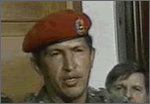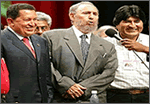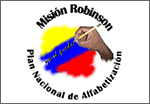|
|
|
 |
 |
 > Political Career > Controversy > The Bolivarian Revolution dimarts, 27 de novembre de 2007
The President of Venezuela, Hugo Chávez, is a highly controversial figure both inside and outside his country. A socialist and anti-imperialist rhetorician, Chávez has this year put forward a proposal to reform the constitution. Voters will decide the matter at a referendum this coming Sunday, 2 December.
Amongst other things, the reform includes a proposal to abolish the limit on the number of times a president can be re-elected (currently, a president is only allowed one re-election) and to increase the presidential term from six to seven years. Chávez is also seeking to limit the autonomy of the Central Bank, to reduce the working day from eight to six hours, and also, to restrict freedom of information in the event of a state of emergency. The reform of the constitution, which makes amendments to a total of 69 articles, has stirred up a significant amount of political controversy. Chávez and his followers claim the reform is essential to strengthen the hold of socialism in the country, although opponents see it as anti-democratic and a move to give the president authority to remain in power indefinitely. Groups against the proposal include businessmen and women, the Catholic Church and students' groups who held demonstrations several months ago against the decision to deny renewal of Radio Caracas Televisión's broadcasting licence. (It should be said, however, that there have also been student demonstrations in support of the plans to reform the constitution.) Either way, Chávez does not, by any means, have the support of everyone. If a few weeks ago victory appeared to be going to those in favour of the proposal, the latest opinion polls give the edge to the no camp.
Political Career
+ Hugo Chávez in 1992.
Born in 1954, Hugo Rafael Chávez Frías made his career within the armed forces. In 1992 he led a failed coup against Venezuelan president Carlos Andrés Pérez, for which he served two years in prison. After setting his sights on politics, Chávez was victorious in the presidential elections of 1998, which he again won in 2000 and 2006, winning comfortably on all three occasions. In 2002, he survived an unsuccessful coup and, in 2004, won a referendum on his continuity as president of the Republic of Venezuela.
Controversy
+ Hugo Chávez, Fidel Castro and Evo Morales.
Expansive, direct and populist, Chávez is a highly controversial figure. The Venezuelan head of state has never been shy in criticising the Catholic hierarchy or the country's elite. His visits to Iraq, his friendship with Fidel Castro and his views on the Israeli-Palestinian conflict have put him on the front page of newspapers all over the world. Then there are his extremely harsh diatribes against the US president, George Bush, who Chávez dubs 'Mr Danger'. Furthermore, he this week announced the breaking of diplomatic relations with Spain following the incident with King Juan Carlos I during which the monarch asked the now-famous question, 'Why don't you shut up?'
The Bolivarian Revolution
+ The missions have made Chávez very popular amongst the nation's most disadvantaged groups.
As Venezuelan leader, Chávez has launched his so-called Bolivarian Revolution, named after Simón Bolívar, hero of Latin American independence, whom Chávez very much admires. Amongst the measures adopted by Chávez are the missions and social programmes (education, health, environment, price reduction of basic necessities), which have made him very popular amongst the nation's most disadvantaged groups. However, his critics maintain that the poverty tax is still very high and that, instead of creating wealth, the president is randomly offering subsidies using the massive profits from oil: Venezuela has one of the world's largest oil reserves.
|
Investiga

> Hugo Chávez, entre els cent personatges més influents, segons Time.

> El president veneçolà, desafiador: 'El rei va tenir sort'.

> Crítica furibunda al president nord-americà, George Bush.

> Cronologia de Veneçuela: 1992-2006.
I també...
- Una valoració positiva de la 'revolució bolivariana' de Chávez.
- Qui fou Simón Bolívar?
- Veneçuela, país de contrasts.
Portada |
Europa Press |
El Punt |
La premsa |
Especials |
Diari de l'escola |
LesFinances.info |
Editorials |
Mail obert |
Els blocs |
Lletres
Tecnologia i ciència | Solidaritat | Cap de 7mana | Campus | El 9 | Presència | Fòrums | Enquestes | Xat | Correu
Traductor | Edicions en Pdf | Wap-pda | Biblioteca | Lletra més grossa
Tecnologia i ciència | Solidaritat | Cap de 7mana | Campus | El 9 | Presència | Fòrums | Enquestes | Xat | Correu
Traductor | Edicions en Pdf | Wap-pda | Biblioteca | Lletra més grossa
| Què és VilaWeb? Publicitat Mapa web Contacte | Una web de Partal, Maresma i Associats, S.L. |

